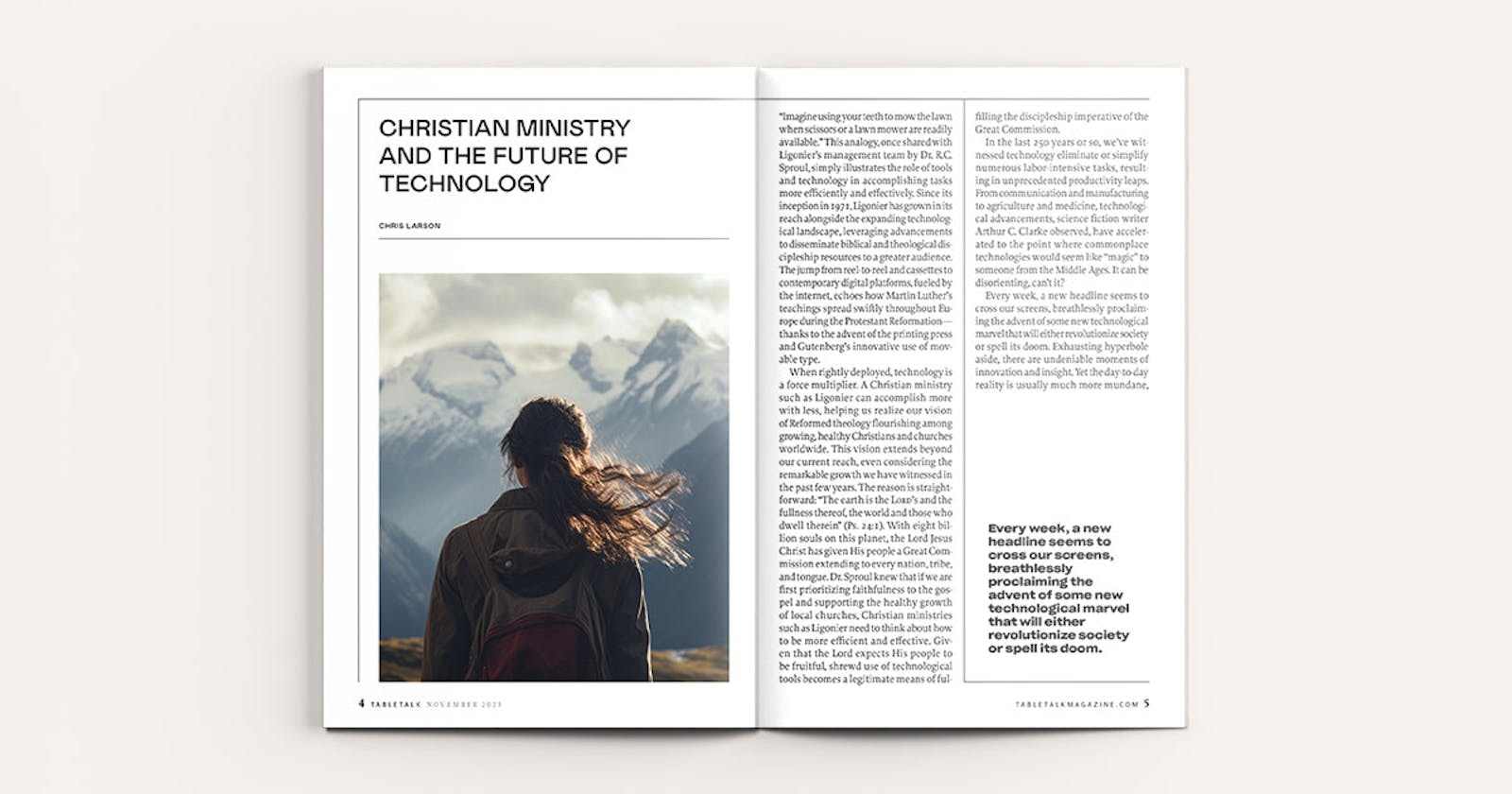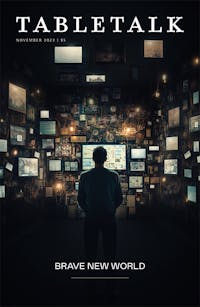
Request your free, three-month trial to Tabletalk magazine. You’ll receive the print issue monthly and gain immediate digital access to decades of archives. This trial is risk-free. No credit card required.
Try Tabletalk NowAlready receive Tabletalk magazine every month?
Verify your email address to gain unlimited access.
“Imagine using your teeth to mow the lawn when scissors or a lawn mower are readily available.” This analogy, once shared with Ligonier’s management team by Dr. R.C. Sproul, simply illustrates the role of tools and technology in accomplishing tasks more efficiently and effectively. Since its inception in 1971, Ligonier has grown in its reach alongside the expanding technological landscape, leveraging advancements to disseminate biblical and theological discipleship resources to a greater audience. The jump from reel-to-reel and cassettes to contemporary digital platforms, fueled by the internet, echoes how Martin Luther’s teachings spread swiftly throughout Europe during the Protestant Reformation—thanks to the advent of the printing press and Gutenberg’s innovative use of movable type.
When rightly deployed, technology is a force multiplier. A Christian ministry such as Ligonier can accomplish more with less, helping us realize our vision of Reformed theology flourishing among growing, healthy Christians and churches worldwide. This vision extends beyond our current reach, even considering the remarkable growth we have witnessed in the past few years. The reason is straightforward: “The earth is the Lord’s and the fullness thereof, the world and those who dwell therein” (Ps. 24:1). With eight billion souls on this planet, the Lord Jesus Christ has given His people a Great Commission extending to every nation, tribe, and tongue. Dr. Sproul knew that if we are first prioritizing faithfulness to the gospel and supporting the healthy growth of local churches, Christian ministries such as Ligonier need to think about how to be more efficient and effective. Given that the Lord expects His people to be fruitful, shrewd use of technological tools becomes a legitimate means of fulfilling the discipleship imperative of the Great Commission.
In the last 250 years or so, we’ve witnessed technology eliminate or simplify numerous labor-intensive tasks, resulting in unprecedented productivity leaps. From communication and manufacturing to agriculture and medicine, technological advancements, science fiction writer Arthur C. Clarke observed, have accelerated to the point where commonplace technologies would seem like “magic” to someone from the Middle Ages. It can be disorienting, can’t it?
Every week, a new headline seems to cross our screens, breathlessly proclaiming the advent of some new technological marvel that will either revolutionize society or spell its doom. Exhausting hyperbole aside, there are undeniable moments of innovation and insight. Yet the day-to-day reality is usually much more mundane, and it is usually over years that we clearly see the cumulative effects of scientific inquiry and iteration.
For example, Nicolaus Copernicus’ shocking sixteenth-century astronomical theory took almost two hundred years to become accepted fact. Even Martin Luther and John Calvin were skeptical in their day. As Dr. Keith Mathison notes in his helpful treatise A Reformed Approach to Science and Scripture, the heliocentric view of the solar system was established only after additional contributions by Galileo Galilei, Johannes Kepler, and Isaac Newton. A biblical worldview understands that God reveals Himself through Scripture and nature. A disciple of the Lord Jesus Christ is uniquely suited for growing in his understanding of nature because believers understand that God is a God of order, He created all things, and therefore nature is intelligible, functioning according to universal, invariant laws that are observable. In fact, Kepler said that we pursue science to “think God’s thoughts after Him.”
There are real breakthroughs in our shared knowledge as those created in God’s image. Christians must diligently study, reflect, and learn, assessing if, when, and how new technology can be used to further faithful service in love for God and neighbor. Sober, hard questions need to be asked and answered. Will this discovery be a blessing to the church and tend to the furtherance of the Great Commission? How will this affect my family? What are the long-term effects on society? Will I be able to live as a free child of God? Francis Schaeffer advocated an approach that affirms the place of actual science while challenging philosophical assumptions that deny God’s existence or involvement in the world. The twentieth-century philosopher Thomas Kuhn coined the term paradigm shift when considering scientific revolutions. That idea of a paradigm shift applies to all sorts of realms beyond technology. For me and likely for many readers of Tabletalk, discovering the biblical truth of Reformed theology was a paradigm shift in my thinking about God’s saving purposes in Christ and God’s covenant dealings with man.
Many Christians are now thinking through the radical upheaval sweeping through society. Those in Western society can no longer assume a generally accepted, biblically informed worldview of right and wrong. Truth is brazenly suppressed (Rom. 1:18–32). At the human level, tolerance in a pluralistic society no longer means tolerance but coercion to endorse that which is ungodly. Intimidating governmental and business forces further restrict religious freedoms. Often, attempts to speak righteous words from a heart of love for God and neighbor are termed “hate speech.” Convictional Christians now find careers truncated and free speech curtailed if they are unwilling to support the latest thing celebrated by pagans. My youngest daughter asked me in tears the other day why people were trying to change the meaning of a rainbow.
There is plenty of suspicious and even outright evil activity surrounding technology and how centralized activity by sinful humans pridefully seeks to make themselves gods, enslaving others into their hell-bent ambitions. Knowledge, when in the hands of corrupt sinners, is prone to unintended consequences, corruption, and idolatry. We need only look at the early pages of Genesis to see humanity’s depravity in using tools to usurp God and harm neighbor. Yet not all tools are necessarily harmful simply because some advances in knowledge have been used to create tools for evil use. It’s been said that even the Apostle Paul used the vast road and postal system of the Roman Empire to distribute his edifying epistles that we now treasure in the canon of Scripture.
What you will find in this issue of Tabletalk are not so much predictions about future technology but reflections on trends leading in several trajectories and how they may affect the global Christian church. We may be living amid several rapid paradigm shifts that previous generations could never have imagined.
Swift technological change feels like the earth shifting beneath our feet. It’s destabilizing. We as Christians in a quickly changing world find an anchor in the changeless, sovereign, holy God, so we never need to put our heads in the sand like the proverbial ostrich. Dr. Sproul would be quick to remind us that the fallen nature of humankind has not changed. Our fundamental problem is that we do not know who God is in all His holy character, and therefore we do not know who we are or our need for a Savior. Living faithfully as Christian disciples means that we will grow in wisdom as our minds are renewed and our lives are transformed in holiness. Our mission is to be obedient to our Lord’s Great Commission, telling others of the Savior who is the way, the truth, and the life (John 14:6). As we are going, we can use some technology for God’s glory to speed support to the front lines of church growth and further missionary activity.
I remember showing an iPod to Dr. Sproul in the mid-2000s and demonstrating how hundreds of teaching series could fit onto a small handheld device, explaining that we could reach tens of thousands more people with such technology. He was somewhat impressed and then smiled and reflected on how decades earlier the staff at the Ligonier Valley Study Center had been early adopters of videotapes. He said that they were so early that the ministry needed to provide VHS players for churches that did not have them yet. Perhaps leading-edge is better than bleeding-edge technology. Today, Ligonier is not serving tens or hundreds of thousands of people, but our reach is now approaching 100 million people per year. This is the vision that Dr. Sproul held up for us, faithfully serving the church by encouraging a worldwide awakening to Reformed theology.

Without compromising the gospel’s message, Christians can soberly assess emerging technology and determine how it can be deployed for the benefit of growing Christians everywhere. May the Lord give us wisdom as we look toward the technological horizon to steward opportunities for Great Commission service, seeking to reach as many people as possible with faithful, trusted teaching.
what’s ahead for …
The Internet: Perhaps more impactful than Gutenberg’s printing press is the mainstream use of this global decentralized network. Entire industries exist that did not before, and the base-layer technology behind the internet is bringing tsunamis of emerging tech. Adoption of online technologies in Asia far eclipses that of Western countries, and the access speeds are blisteringly fast. The expeditious network infrastructure buildout in Africa and the significant population growth there will see another billion people brought online in less than ten years. The seemingly relentless push to connect devices pervades nearly all of modern life, simultaneously bringing convenience and massive privacy concerns. Blockchain technology, with decentralized public data registers, holds promise for more transparent and faster transactions, more portable assets and stores of value, more access for billions of people unable to use traditional banks and finance, and more.
Computing Power: Processing speeds of microchips have exponentially increased even as their size shrinks. Smaller, more energy-efficient chips enable new design possibilities in devices such as hearing aids and autonomous vehicles. Chip costs will decline even as functionality and versatility grow. Quantum computing is another field of research that would dramatically scale computing power if it became mainstream.
Energy: While the Lord has designed Earth to continue providing plenty of natural resources to produce energy for our populations, not all that energy is efficiently distributed. Physics limitations are apparent with current battery storage technology. The laws of thermodynamics notwithstanding, perhaps we’ll see a scientific “megaleap” in the next few decades with the widespread use of nuclear fusion. Like man’s discovering how to use fire or inventing the wheel, harnessing the power of the stars with fusion’s superabundant energy would change civilization.
Medicine and Biology: Better understanding of how God designed our bodies at the gene level has improved treatments for illness and disease. Ethical questions abound for new synthetic hormones and neural implants. Medically possible augmentations have sought to deconstruct universally understood definitions of gender and sexuality. While recent ultrasound technology has given a window to see the precious baby in the womb, abortion-minded people now have medicine readily available if they decide to kill their child. Embryos frozen decades ago are given new life opportunities by adoptive parents.
Machine Learning: With billions of connected devices on the internet, data has proliferated and software systems have been created to ingest and provide novel applications in many fields, including commerce, healthcare, finance, manufacturing, and transportation. Complex calculations and pattern matches are performed seemingly instantly, providing an appearance of artificial intelligence. Whether AI remains a helpful tool or becomes a master remains to be seen.
